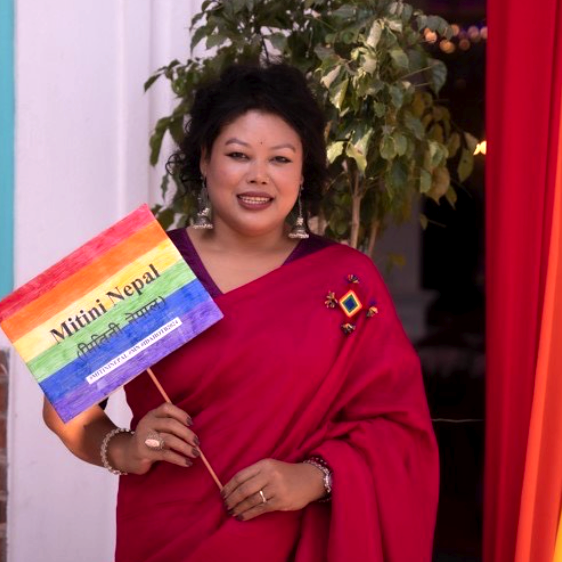You gave an interview to Alturi in 2020 in which you spoke about recent progress in constitutional protections for LGBTI people but also noted that many in Nepal still held onto some negative stereotypes. How has broader sentiment toward LGBTI people in Nepal changed over the last four years?
Over the past four years, there have been notable changes in wider sentiment toward LGBTI people in Nepal. While progress has been made in terms of constitutional protections and legal advancements, there remains a persistence of negative stereotypes among segments of the population.
In 2023, Mitini Nepal took significant steps by filing a case with the Supreme Court to challenge the current definition of marriage in Nepal, which restricts it to being between a man and a woman. This initiative underscores ongoing efforts to advocate for inclusive legal reforms that recognize and respect diverse forms of partnerships within the LGBTI community.
Additionally, since 2020, the National Bureau of Statistics of Nepal conducted the National Population Census, which included counting LGBTQ populations in household listings. This survey was pivotal in providing empirical evidence of the community’s demographics and specific needs.
Despite Nepal’s constitution recognizing minority groups, sexual and gender minorities are currently not included within this legal framework. Mitini Nepal’s advocacy aims to address this gap by advocating for the explicit inclusion of LGBTI people as a recognized minority group in the constitution. Such inclusion would grant the community access to legal protections and provisions that are afforded to other minority groups in the country, ensuring their rights and representation are upheld in national policies and programs.
Overall, while legal and policy changes are pivotal, Mitini Nepal recognizes the parallel importance of changing societal attitudes and behaviors toward LGBTI individuals. This holistic approach aims to create a more inclusive and equitable society where all individuals, regardless of sexual orientation or gender identity, can live free from discrimination and enjoy full human rights.
At the time of your 2020 interview with Alturi, Nepal did not have any openly LGBTI people serving in government. You shared that one of Mitini’s goals was to help change that. What efforts has Mitini been involved in since 2020 to increase the representation of LGBTI people in politics, particularly LBTQ women?
Since 2020, Mitini Nepal has been actively working to increase the representation of LGBTI people in politics, focusing on LBQ women.
Advocacy: Mitini Nepal advocates for including sexual and gender minorities in government positions despite the absence of openly LBQ individuals in government.
Local Engagement: The organization advocates for the representation of marginalized groups, including LBQ women, across 753 local units.
Collaboration: Mitini Nepal collaborates with national bodies to advocate for inclusion and diversity and highlight LBQ women’s unique challenges.
Capacity Building: The organization conducts capacity-building initiatives for sexual and gender minorities, particularly LBQ women.
Mitini Nepal aims to increase the representation of LGBTI individuals in political spheres and foster a more inclusive and representative government that reflects Nepal’s diversity.
How can LGBTI folks and allies abroad help to aid Mitini’s efforts in Nepal?
LGBTI individuals and allies outside of Nepal can support Mitini’s efforts in several ways:
Research Assistance: Collaborate on research initiatives related to challenges faced by LBQ women in Nepal, such as intimate partner violence or government office employment. Sharing expertise and resources for research can help generate valuable insights for advocacy efforts.
Platform Creation: Create spaces for LBQ women from Nepal to share their experiences. We need volunteers to support video documentaries, podcasts, or online forums showcasing the diverse stories and challenges of LGBTI individuals in Nepal.
Advocacy and Awareness: Advocate for the visibility and rights of LGBTI individuals in Nepal globally and regionally. Raise awareness among international audiences about the challenges LBQ women face in Nepal to garner support for their rights.
Capacity Building: Provide training and capacity-building opportunities for Mitini Nepal and its members, including advocacy strategies, leadership development, digital media skills, and legal empowerment, to enhance our ability to advocate effectively for LGBTI rights.
Financial Support: Financial contributions or fundraising support are crucial to sustaining Mitini Nepal’s programs and initiatives. Funding is necessary for conducting research, organizing events, and implementing advocacy campaigns that promote the rights and visibility of LGBTI communities in Nepal.
By working together and supporting Mitini Nepal in these ways, individuals and allies outside of Nepal can help bolster advocacy efforts, enhance visibility, and promote the rights of LBQ women and LGBTI individuals in Nepal’s social and political landscape.
Please visit Mitini Nepal’s What You Can Do page to learn more about how you can support Mitini’s efforts.
This piece was edited for concision to ensure that the text reflects the activist’s intended meaning in the simplest way possible.

